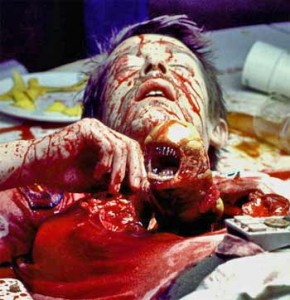In one of my most overwrought posts (and there are a lot of overwrought posts on this blog) I despaired, somewhat histrionically, that in order to survive the horrors of the Age of Trump, I had to try to block it out and look inward. What was happening was simply too terrible, too alarming to deal with. I concluded, rather hopelessly,
On the eve of World War I, British Foreign Secretary Edward Grey famously remarked, “The lamps are going out all over Europe, we shall not see them lit again in our life-time.” Will we see them lit again in America? For now, all we can do is stand and wait. And maybe pray. I do not mean in any way to be an alarmist, but I do believe Trump is going to be worse than any of us imagine. I fear we are going to be in nightmare mode for years to come, if not for generations (thanks to a Trump-selected Supreme Court). A tragedy, in every way. A complete and total tragedy.
The bad news is that I am now just as pessimistic about my country’s future. Maybe even more so. We seem to exist from one Trump atrocity to the next. Weeks seem like months, months like years, as each day brings another outrage, so many so quickly that we can’t keep up. This past week he injected nasty political swipes during an address to the Boy Scouts. Just a couple of days later he told police not to be “too nice” when arresting suspected gang members, a particularly ugly example of Trump’s brutality, actually encouraging police to rough up people they arrest, throwing to the winds the concept of innocent until proven guilty. The day before that we witnessed his new communications director referring to the sitting chief of staff as a “fucking paranoid schizophrenic.” Today he ranted against China, as though Xi Jinping could erase the threat of North Korea’s nuclear program with a wave of his hand.
It all started on June 16, 2015, the day Trump announced his candidacy. I watched it live, transfixed. Here was a candidate for the presidency of the United States slandering Hispanics with glee. We all remember his chilling words that day.
When Mexico sends its people, they’re not sending their best….They’re sending people that have lots of problems, and they’re bringing those problems with us. They’re bringing drugs. They’re bringing crime. They’re rapists.
How on earth could he hope to win the nomination while preaching hatred and racism? He would have to burn out in a matter of weeks, right? Americans would obviously see how menacing and unhinged he was, right?
For months I watched him closely, and I began to become calloused – little Trump said could surprise me. He shocked me, but he did not surprise me. I watched in astonishment when he said John McCain was only a war hero because he got captured. My jaw dropped when he made fun of a journalist with a neurological disease. And perhaps I was most stunned when I heard him utter these words in December, 2015:
“Donald J. Trump is calling for a total and complete shutdown of Muslims entering the United States until our country’s representatives can figure out what the hell is going on.”
This was deranged on several levels. Imagine President Obama announcing a ban on Jews seeking to come to America. Never before had we seen a “serious” politician slander an entire religion. Trump barely concealed his racism as he preached his message of “law and order,” which is code for keeping blacks and Hispanics in check. It was a message of fear. Fear of immigrants, fear of blacks, fear of Muslims, fear of Hispanics. Then he lashed out at Elizabeth Warren, dubbing her “Pocahontas,” another racist slur (imagine calling President Obama “Sambo”). When would it stop? When would he implode?
I admit, I was hypnotized. Like so many others, I watched the Trump rallies and speeches slavishly, in a state of bemused wonder. Bemused because he would, of course, never actually win. The networks became all Trump all the time. He was spectacular for their ratings; everyone wanted to enjoy the spectacle of this madman’s rants and insults. He had no fear of offending vast swaths of Americans (like the “elites”). The cheers of his adoring crowds gave him electrifying energy. He never backed down, never apologized, never showed any signs of conscience. He encouraged his fans to rough up protesters at his rallies, offering to help pay their legal bills. Ugliest of all, perhaps, was his constant smearing of Hillary Clinton as a criminal – a charge that stuck to her, and that he still rants about, calling for his attorney general to pursue criminal charges against her for using a private server, an issue that then-FBI director Jim Comey put to rest months earlier, saying she was careless but in no way criminal.
Then we watched him win one primary after another. Jeb Bush, we were told, was going to be the front runner, and maybe Marco Rubio would be his most serious opponent. Trump was a bad joke. He had to flame out. But we all know what happened next.
The fascination with all things Trump continues. Cable news cannot serve up enough of Trump, countless panels never tire of dissecting his every word, every tweet. Noxious Trump surrogates on CNN lie through their teeth defending him, and for some reason the network keeps them on despite their obvious prevarications. And I contribute to this circus, obsessively watching all the cable shows, and then tuning in later at night to watch Steven Colbert and Seth Meyers, both of whom have made mocking Trump a cottage industry.
We are now more than six months into this nightmare and things keep going from bad to worse. All the hope that he would “grow into the job,” that “sane” voices like Ivanka Trump’s and Jared Kushner’s, would keep him in check, and that experienced advisors like Generals Maddis and MacMaster would rein him in — none of it happened. And the Democrats can’t seem to come up with a credible alternative; where is the leader we can rally around and look to for leadership in 2020? And what is the Democrats’ message? This was a serious flaw in the Clinton campaign: she never successfully articulated a message that would bring people together. Trump’s Make America Great again and Bernie Sanders’ promise of a Better Tomorrow and a new deal for the working and middle classes, were effective, whatever we may think of Trump and Sanders. And let me be clear that I thought Clinton was a qualified, intelligent, experienced statesman who would have made an excellent president. But I was frustrated at her inability to articulate a vision, other than her promise to keep building on the foundations Obama had laid down. This proved to be tone deaf: Americans wanted a sea change; what we had wasn’t working for them. They wanted a leader who would “drain the swamp” and listen to the working people. Trump exploited their fears and prejudices masterfully. You have to give him credit. He tapped into a vein of anger, despair and frustration. Never mind that his promises were empty and that his words would ring hollow. He was a shrewd politician and I hope the Democrats can learn from him. The message is everything. What is the Democrats’ message?
At the moment, the only ray of hope I can see is the inability of Trump to get anything done. His narcissistic arrogance is equaled only by his incompetence and tendency to thrive on chaos. But don’t forget, he will almost certainly name at least one more Supreme Court justice, and the fate of Roe v. Wade (and plenty of other decisions) will be in danger. The Court will shape what America is for years, maybe decades, to come. And that is too scary to contemplate.
Thanks for indulging me as I rant against Trump for the second time in six months. I just had to get it out of my system. Meanwhile, I will keep doing all I can to support the resistance, but for now I remain half-paralyzed. I fear we still haven’t seen the worst of Trump’s presidency. It’s going to be a long three and a half years.


Comments